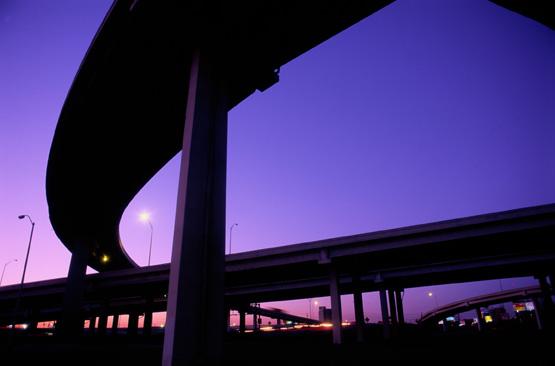|
 On May
14th the House voted 410 to 5 to provide an additional $4.4 in budget
authority and $1.118 billion in outlays for the FY 2003 highway
appropriation. This restores the highway program to the $27.7 billion
guaranteed under TEA21. The TEA21 funding mechanisms provided that if
Highway Trust Fund Revenues grew beyond those garanteed in TEA21, the
budget for the program would grow. This so-called Revenue Aligned Budget
Authority or RABA allowed the highway program to expand from the $27.7
billion level contained in TEA21 to $31.8 billion last year based on
increased deposits to the Trust Fund resulting from the economic
expansion. However, with the slow-down in the economy and subsequent
reduction in fuel tax revenues the RABA provision in TEA21 required that
the Administration not only reduce current spending, but look back to the
previous year's commitments and write down current spending to reflect
those obligations in light of reduced current revenue trends. On May
14th the House voted 410 to 5 to provide an additional $4.4 in budget
authority and $1.118 billion in outlays for the FY 2003 highway
appropriation. This restores the highway program to the $27.7 billion
guaranteed under TEA21. The TEA21 funding mechanisms provided that if
Highway Trust Fund Revenues grew beyond those garanteed in TEA21, the
budget for the program would grow. This so-called Revenue Aligned Budget
Authority or RABA allowed the highway program to expand from the $27.7
billion level contained in TEA21 to $31.8 billion last year based on
increased deposits to the Trust Fund resulting from the economic
expansion. However, with the slow-down in the economy and subsequent
reduction in fuel tax revenues the RABA provision in TEA21 required that
the Administration not only reduce current spending, but look back to the
previous year's commitments and write down current spending to reflect
those obligations in light of reduced current revenue trends.
 Because there is a large - approximately $18 billion -
surplus in the Highway Trust Fund, the House was willing to restore $4.4
billion to the FY 2003 program above the $23.3 billion the Administration
requested thus keeping the $27.7 TEA21 guaranteed level. In looking at why
the House took this step we can see the future motives behind a TEA21
reauthorization. Many members saw it as a jobs and economic stimulus bill,
claiming the restoration of funding would protect 180,000 jobs. Other
members such as Highway and Transit Subcommittee Chairman Tom Petri (R-WI)
and Ranking Member Bob Borski (D-PA) said the state programs could not
absorb such a cut and maintain their highway programs. Transportation and
Infrastructure Committee Chairman Don Young (R-AK) said this restoration
was vital to establishing future funding levels for reauthorization. But
the Committee's Ranking Member Jim Oberstar (D-MN) noted that the
compromises needed to move the measure included 49 new projects
recommended by the House Appropriations Committee. The increasing use of
this approach leaves DOT little discretion in managing the spending
aspects of the program. Reauthorization will see a combination of projects
and state programs as the driving forces behind the spending limits for
the next highway bill. Because there is a large - approximately $18 billion -
surplus in the Highway Trust Fund, the House was willing to restore $4.4
billion to the FY 2003 program above the $23.3 billion the Administration
requested thus keeping the $27.7 TEA21 guaranteed level. In looking at why
the House took this step we can see the future motives behind a TEA21
reauthorization. Many members saw it as a jobs and economic stimulus bill,
claiming the restoration of funding would protect 180,000 jobs. Other
members such as Highway and Transit Subcommittee Chairman Tom Petri (R-WI)
and Ranking Member Bob Borski (D-PA) said the state programs could not
absorb such a cut and maintain their highway programs. Transportation and
Infrastructure Committee Chairman Don Young (R-AK) said this restoration
was vital to establishing future funding levels for reauthorization. But
the Committee's Ranking Member Jim Oberstar (D-MN) noted that the
compromises needed to move the measure included 49 new projects
recommended by the House Appropriations Committee. The increasing use of
this approach leaves DOT little discretion in managing the spending
aspects of the program. Reauthorization will see a combination of projects
and state programs as the driving forces behind the spending limits for
the next highway bill.
The Senate left
Washington for its Memorial Day Recess before completing action on its
supplemental appropriations bill. Sen. Robert Byrd (D-WV) wishes to
include RABA restoration as part of the supplemental. With 74 senators
co-sponsoring a $4.4 billion restoration level, action is almost certain.
Only differences between House and Senate budget calculation methods may
cause a slight delay.
Congress has begun to
recognize the financial problems with the Highway Trust Fund. The House
included in its funding restoration measure a resolution calling for a new
RABA formula that will smooth the peaks and valleys associated with the
current funding methods.
 In
further recognition of Highway Trust Fund financial problems, Sen. Max
Baucus (D-MT) held the first Senate Finance Committee hearing on revenue
issues related to the Trust Fund. He used the hearing to gather
information from the Treasury Department, the General Accounting Office
(GAO) and the Congressional Budget Office (CBO) on tax administration, the
revenue impact of alternative fuels' tax subsidies and revenue forecasting
methods. The Senator is proposing to move the current 2.5 cents gasohol
tax - which currently goes into the general fund to the Highway Trust
Fund. In addition, he would compensate the Trust Fund for the 5.3 cents
tax subsidy that ethanol receives by a transfer from the general fund
equal to moneys ethanol would pay to the Trust Fund if it was taxed like
other motor fuels. He noted that the continued diversion of highway taxes
to non-highway purposes and the exemption of various fuels from paying
their fair share of highway costs are endangering the user fee/Trust Fund
concept. As we move into TEA21 reauthorization, the methods and amounts
for funding future highway investments will be a major issue. In
further recognition of Highway Trust Fund financial problems, Sen. Max
Baucus (D-MT) held the first Senate Finance Committee hearing on revenue
issues related to the Trust Fund. He used the hearing to gather
information from the Treasury Department, the General Accounting Office
(GAO) and the Congressional Budget Office (CBO) on tax administration, the
revenue impact of alternative fuels' tax subsidies and revenue forecasting
methods. The Senator is proposing to move the current 2.5 cents gasohol
tax - which currently goes into the general fund to the Highway Trust
Fund. In addition, he would compensate the Trust Fund for the 5.3 cents
tax subsidy that ethanol receives by a transfer from the general fund
equal to moneys ethanol would pay to the Trust Fund if it was taxed like
other motor fuels. He noted that the continued diversion of highway taxes
to non-highway purposes and the exemption of various fuels from paying
their fair share of highway costs are endangering the user fee/Trust Fund
concept. As we move into TEA21 reauthorization, the methods and amounts
for funding future highway investments will be a major issue.
| 
